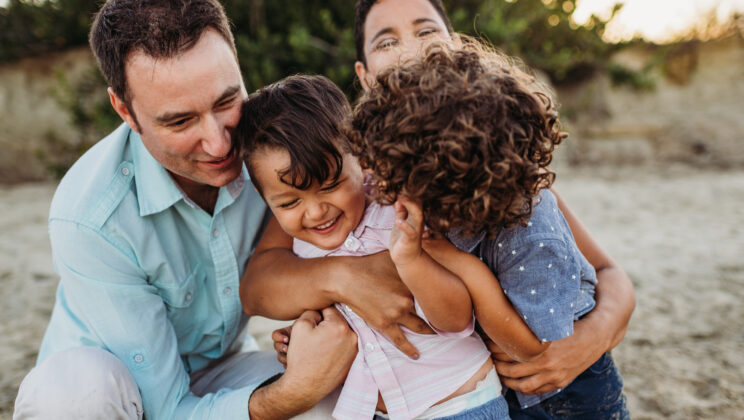Building a Village for Family Mental Health Care
July 28, 2022
We’ve all heard that it takes a village to raise a child, but for many modern parents, this proverb feels like an unattainable fantasy. This trend has been exacerbated by the past three years of living through a pandemic that put up additional boundaries between families and their support networks.
Simply put, we were never meant to raise children in isolation. This is true even in the best of circumstances. But when a child is struggling with their mental health, parents are often left feeling more alone than ever.
Nearly one in five children in America has a mental, emotional, or behavioral health disorder, according to the Centers for Disease Control and Prevention (CDC). Unfortunately, only 20 percent of those children struggling ever get specialized treatment. That means 16 percent of all children are suffering from untreated mental health conditions.
Barriers to treating children’s mental health disorders
Children’s mental health disorders often go untreated because our current mental health care system is not sufficient. Suicide is the second leading cause of death in people ages 10-24. In 2020, mental health-related emergency department visits among children ages 12-17 rose by 31 percent over the prior year. However, less than half of emergency departments in the U.S. are equipped to handle mental or social health concerns in children.
Outside of emergencies, barriers to mental health treatment can feel even higher. Any parent who has sought care for their child will likely tell you that they faced significant challenges. These often include weeks of calling providers, incredibly long wait times, a lack of information on what kind of care could actually help their child improve, and the unquantifiable stress that comes with the weeks and months of feeling helpless watching their child suffer.
“The mental health of parents and children are inextricably linked,” said Kendall Browne, PhD, program manager of workforce mental health at Lyra Health. “Knowing that your child is struggling is a profound stressor for a parent.”
The pandemic has exacerbated this trend. One study found that the prevalence of depression and anxiety symptoms in children and teens since COVID-19 has doubled, compared with pre-pandemic estimates, particularly in older adolescents and girls.
Defining high-quality children’s mental health care
From the beginning at Lyra, we knew how critical offering dependent care would be for working families. We also knew that in order to be effective, our network of providers needed to be a complete village. I am proud to say that we have the largest evidence-based provider network for kids and teens in the U.S. We have more than 3,500 specialists across all 50 states who work with patients under 18. They have each gone through our proprietary clinical vetting process to ensure that they are skilled in delivering evidence-based treatments.
Unlike adults, where clinical presentations are fairly consistent, mental health issues in children differ significantly based on age, due to varying cognitive abilities and emotional needs. A 3-year-old acting out because they cannot manage their intense emotions has different needs than a depressed teenager who is withdrawing from friends and family. Since mental health issues in kids don’t necessarily present the same way as in adults, they can be hard for parents to spot. How do you know when a behavior is a normal part of development, a mental health challenge, or a red flag?
“Kids are hard on themselves because they don’t know the difference either,” said Alethea Varra, PhD, vice president of clinical care at Lyra. “ They may hear and feel that they’re ‘bad kids’ because they are getting in trouble at school or their grades or suffering, so they withdraw rather than seeking help.”
To accommodate the full range of needs, we recruit providers who specialize in the individual age brackets of young children under 5, school-aged kids, and teenagers. We also proactively recruit specialists with expertise in issues that are more common in kids and teens such as ADHD, behavior problems, bullying, and eating disorders. Based on their symptoms, we match children to the right providers offering age-appropriate, evidence-based therapy for their particular needs.
Providing meaningful, measurable results for children
For children under five, behavior problems are the main reason families seek help, and the gold standard evidence-based treatments fall under the umbrella of behavioral parent training. These interventions give parents tools to help their children. I’ve personally experienced Parent-Child Interaction Therapy, where our therapist watched my child and I interact via video call and then offered tools and strategies in the ear bud I was wearing. These six therapy sessions were life-changing for our family because of the skills we learned such as “positive reinforcement” and “special playtime,” which we continue to practice every day.
The 6-11 age group is particularly important from a clinical standpoint because this is where we tend to see anxiety and mood disorders start to develop. And, the earlier you can intervene, the better for both the child and their family. Younger kids with anxiety aren’t going to be able to grasp what they’re worried about so it will often show up as somatic complaints—“my stomach hurts” or “my head hurts”—or fight, flight, or freeze responses in new or scary situations.
“Prevention is the best intervention,” said Monica Wu, PhD, senior clinical product manager at Lyra Health. “It's always easier to prevent before it gets really bad and really challenging, and before maladaptive habits and thinking patterns become entrenched.”
Through interventions like cognitive behavioral therapy and exposure therapy, we can give children tools to help them throughout their lives.
Teenagers are in a mental health crisis
The American Academy of Pediatrics declared a national emergency in children and adolescent mental health in October 2021. From 2009 to 2019, the share of high school students who reported persistent feelings of sadness or hopelessness increased by 40 percent, to more than one in three students. Suicidal behaviors among high school students also increased during the decade preceding COVID (a 36 percent increase of those considering attempting suicide and a 44 percent increase of those having made a suicide plan in the prior year).
Teens also manifest mental health symptoms differently. While they may be able to more clearly indicate what they’re worried about when it comes to anxiety, depression will often present as irritability rather than overt sadness. It’s difficult for parents to know when their child is really struggling versus just being a teenager. The key is to look for behavior changes and whether their mood is negatively impacting their day-to-day life. Are there things they used to enjoy that they don’t anymore? Are they isolating themselves from friends and family?
When it comes to evidence-based treatments for teens with depression, Interpersonal Therapy can be particularly helpful. It has a large focus on the link between social relationships and mood, given the salience of relationships for that age range
There are few things scarier for a parent than seeing that your child needs help but not having the tools or resources to help them. We’ve heard from many that seeking care through traditional systems can feel isolating, frustrating, and defeating. Parents today don’t have to go it alone—our village is here to help.
Download our guide to learn more about children’s mental health benefits.
CONTACT US
If you want help connecting with a coach or therapist, Lyra can assist you. You can get started today if Lyra is offered by your employer. Sign up now.
For employers who want to learn more about the value and impact of a mental health benefit, download our white paper or get in touch.
And check in frequently here or follow us on Facebook, LinkedIn, and Twitter for more insights into supporting employees’ mental health.
ABOUT THE EXPERT
Connie Chen, MD, is the chief operating officer at Lyra Health where she oversees clinical, product, and operations including the development of Lyra's blended care programs. She was the co-founder and former chief medical officer at Vida Health. Connie currently serves on the Board of Overseers at University of California, San Francisco. She has published extensively on open frameworks for mobile health as well as use of comparative effectiveness research design in leading medical journals such as the Journal of the American Medical Association, Archives of Internal Medicine, and the Journal of Medical Internet Research. She earned a bachelor’s degree in economics at Harvard, a medical degree from UCSF, and completed her internal medicine training at Stanford.
Explore additional blogs

Whole family care
How Family Relationships Influence Who We Become

Youth mental health
4 Things You Should Know About Adolescent Mental Health

Youth mental health